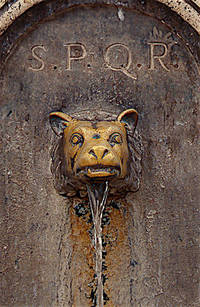As work for the 12th edition of Blue Guide Rome goes full steam ahead, we found ourselves coming up time and time again against the letters SPQR, reproduced all over the city, on lamp posts, manhole covers and public fountains, not to mention in ancient inscriptions. Here is a little piece on that and other familiar quotations from ancient Rome.

The Latin acronym SPQR (which stands for Senatus Populusque Romanus, ‘the Senate and People of Rome’) has been used since the days of the Republic to represent the Romans (significantly giving ‘the people’ equal status with ‘the Senate’). Today it stands for the municipality and it appears carved, embossed and stencilled in numerous places all over the capital. In fact, it is still such a familiar ‘word’ that it was chosen by the Cambridge Professor of Classics Mary Beard as the title of her best-selling history of ancient Rome in 2015 (SPQR: A History of Ancient Rome).
Many of the other familiar quotations still in use in the English language are—perhaps not surprisingly—linked to the most famous character in ancient Roman history, Julius Caesar. His famous quip ‘Veni, vidi, vici’ (‘I came, I saw, I conquered’) is reported by Plutarch and is meant to have been the message sent back by Caesar to the Romans about how he was getting on with his military campaigns in Gaul. It sums up the character of a general who managed to conquer enemy territory with astonishing speed.
The ‘crossing of the Rubicon’, used to signify an irrevocable step or point of no return, refers to the river which marked the northern boundary of Italy with Cisalpine Gaul, the province which had been allotted to Julius Caesar. When Caesar descended with his huge army and crossed into Roman territory, he became in effect an ‘invader’ and although at the time it seemed he would have been able to take over the rule of the Empire on his arrival in Rome, in fact this was delayed for some years and he was not able to prevent the outbreak of a civil war. The exact date of the crossing is still disputed (perhaps 49 BC) and interestingly enough the exact location of the river (possibly no more than a stream) has never been established.
It was Shakespeare who first used the phrase ‘Et tu, Brute?’ (‘You, too, Brutus?’) in his play Julius Caesar, when the wounded hero recognises the renegade Brutus in the group of his assassins. Other expressions which have survived the centuries include ‘When in Rome do as the Romans do’ and ‘Rome was not built in a day’ (perhaps first used in the early 17th century by Cervantes and Robert Burton, author of the Anatomy of Melancholy in 1621).
One of the most famous re-interpretations to have survived is ‘Civis Romanus sum’ (‘I am a Roman citizen’), famously used by J.F. Kennedy in West Berlin in 1963 (‘All free men are citizens of Berlin: ich bin ein Berliner’), and subsequently voiced by political leaders as well as in public demonstrations against injustices. As Mary Beard has pointed out, the expression Civis Romanus sum was used in ancient Rome as a defence by citizens who were considered to have committed a crime (and St Paul, when condemned as a Christian, spoke out in his own defence as a Roman citizen): no Roman citizen could be condemned unheard, and nor could he be scourged or beaten without a fair trial. As a result of his citizenship, St Paul could not be condemned to death by crucifixion; he was beheaded instead. President Kennedy used the famous expression at a time when West Berlin was an embattled enclave surrounded on three sides by the hostile GDR.
by Alta Macadam. The new, fully revised and updated Blue Guide Rome (12th edition) will be published early next year.






